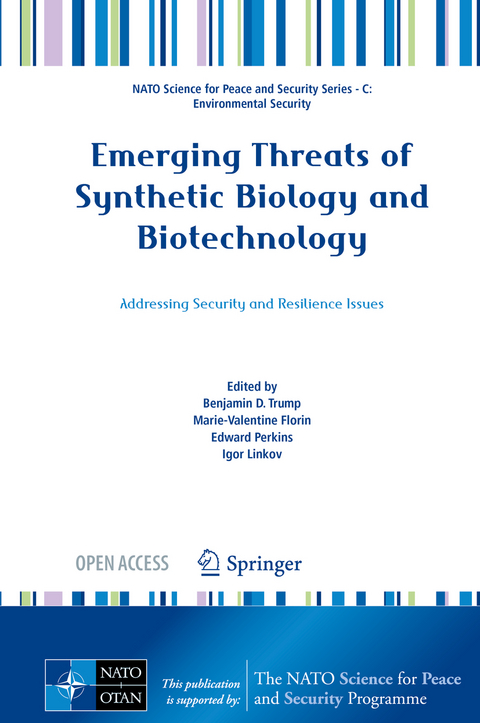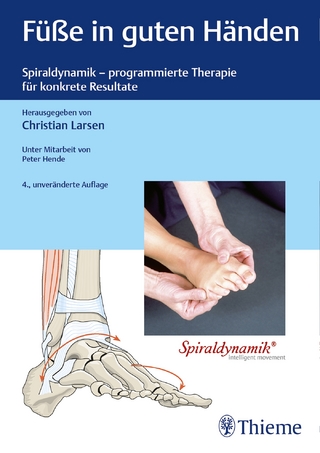
Emerging Threats of Synthetic Biology and Biotechnology
Springer (Verlag)
978-94-024-2085-2 (ISBN)
This open access book presents discussions on risks and mitigation strategies for these technologies including biosecurity, or the potential of synthetic biology technologies and processes to be deliberately misused for nefarious purposes. The book presents strategies to prevent, mitigate, and recover from ‘dual-use concern’ biosecurity challenges that may be raised by individuals, rogue states, or non-state actors. Several key topics are explored including opportunities to develop more coherent and scalable approaches to govern biosecurity from a laboratory perspective up to the international scale and strategies to prevent potential health and environmental hazards posed by deliberate misuse of synthetic biology without stifling innovation. The book brings together the expertise of top scholars in synthetic biology and biotechnology risk assessment, management, and communication to discuss potential biosecurity governing strategies and offer perspectives for collaboration in oversight and future regulatory guidance.
Benjamin D. TRUMP Dr. Benjamin D. TRUMP is a Research Social Scientist for the US Army Corps of Engineers. Dr. Trump’s work focuses on decision making and governance of activities under significant uncertainty, such as emerging and enabling technologies (synthetic biology, nanotechnology) and developing organizational, infrastructural, social, and informational resilience against systemic threats to complex interconnected systems. Dr. Trump served as a delegate to assist US presence in OECD’s Global Science Forum in 2017, and was the President of the Society for Risk Analysis’ Decision Analysis and Risk Specialty Group in 2018-2019, as well as its Resilience Analysis Specialty Group in 2019-2020. He was selected as a Fellow of the Emerging Leaders in Biosecurity Initiative, Class of 2019. In December 2020, Dr. Trump was installed as the Treasurer of the Society for Risk Analysis. Dr. Trump was also a contributing author ofthe International Risk Governance Council’s Guidelines for the Governance of Systemic Risks, as well as their 2nd Volume of the Resource Guide on Resilience. Dr. Trump is also frequently active with several Advanced Research Workshops for the North Atlantic Treaty Organization’s Science for Peace Programme. Co-authored with Dr. Igor Linkov, Dr. Trump’s book The Science and Practice of Resilience (2019) includes a detailed discussion of the methodological, philosophical, and governance-related work behind the concept of resilience. His follow-up book with Dr. Myriam Merad, Expertise Under Scrutiny (2020), addresses the challenges facing decision makers of how to construct and implement scientifically formed and institutionally valid decisions within an environment of heightened uncertainty and public criticism. Dr. Trump received his Ph.D. from the University of Michigan’s School of Public Health, Department of Health Management and Policy in 2016. He received an M.S. (2012) in Public Policy and Management and a B.S. in Political Science (2011) from Carnegie Mellon University. Marie-Valentine FLORIN Marie-Valentine Florin is the Executive Director of the International Risk Governance Center (IRGC), at Ecole Polytechnique Fédérale de Lausanne (EPFL) in Switzerland. IRGC acts at the interface between science and policy and is particularly active about risks related to emerging technologies, marked by complexity, uncertainty and ambiguity. She continues to develop the concepts and guidelines for risk governance established by the IRGC Foundation, with a focus on emerging and systemic risks, for which the risk and the resilience governance perspectives are relevant. She convenes multi-stakeholder groups of experts to consider the particular risks and governance challenges that arise in specific sectors such as digital technologies, climate engineering, nanotechnology, or synthetic biology. Before joining the IRGC Foundation in 2006, Ms Florin spent the first part of her career (1984-1999) in an international socio-cultural research and marketing consulting firm. She graduated from Science Po in Paris (public policy and management) and then earned post-graduate diplomas in marketing strategy, sustainable development and environmental diplomacy. She is Society for Risk Analysis Fellow and a member of the Advisory Board to the Global Risk Report of the World Economic Forum. Edward J. PERKINS Dr. Edward J. PERKINS is currently the Acting Army Deputy Chief Scientist and Army Senior Research Scientist for Environmental Networks and Genetic Toxicology with the Army Corps of Engineers. His work focuses on using genetics and biotechnology to assess chemical hazards and develop novel applications to support Army activities including new materials andsynthetic biology. Dr. Perkins provides guidance for the Army and Department of Defense (DoD) on basic and applied research programs, in addition to consulting on issues of national and international importance for the Army Corps of Engineers, Department of Defense, the United States Environmental Protection Agency, and the Organization for Economic Cooperation and Development. He has published widely on genetics, toxicology and novel approaches for risk assessment, including 4 books and over 150 peer reviewed manuscripts and book chapters. Dr. Perkins has served many organizations as an expert panelist and has been a co-organizer for multiple national and international workshops and conferences. Dr Perkins received his Ph.D. in Genetics and Cell Biology from Washington State University in 1987 and a B.A. in Genetics from University of Illinois in 1983. He completed his postdoctoral training in genetics at the Universityof Washington and Washington State University. Igor LINKOV Dr. Igor LINKOV is the Risk and Decision Science Focus Area Lead with the US Army Engineer Research and Development Center, and Adjunct Professor with Carnegie Mellon University. Dr. Linkov has managed multiple risk and resilience assessments and management projects in many application domains, including emerging materials and technologies, cybersecurity, transportation, supply chain, homeland security and defense, and critical infrastructure. He was part of several Interagency Committees and Working Groups tasked with developing risk and resilience metrics and management approaches, including the US National Nanotechnology Initiative. Dr. Linkov has organized more than thirty national and international conferences and continuing education workshops, including NATO workshops on Nanotechnology in Portugal (2009), Climate Change in Iceland (2010, 2012),Resilience in Portugal (2016), Estonia (2018) and Finland (2019), as well as Chaired Program Committee for 2015 and 2019 World Congresses on Risk in Singapore and Cape Town. He has published widely on environmental policy, environmental modeling, and risk analysis, including twenty five books and over 400 peer-reviewed papers and book chapters in top journals, like Nature, Nature Nanotechnology, Nature Climate Change, among others. He has served on many review and advisory panels for DOD, DHS, FDA, EPA, NSF, EU and other US and international agencies. Dr. Linkov is Society for Risk Analysis Fellow and recipient of 2005 Chauncey Starr Award for exceptional contribution to Risk Analysis, 2014 Outstanding Practitioner Award as well as 2019 Distinguished Educator Award. He is Elected Fellow with the American Association for the Advancement of Science (AAAS). Dr. Linkov has a B.S. and M.Sc. in Physics and Mathematics (Polytechnic Institute) and a Ph.D. in Environmental, Occupational and Radiation Health (University of Pittsburgh). He completed his postdoctoral training in Risk Assessment at Harvard University.
Chapter 1: Biosecurity for Synthetic Biology and Emerging Biotechnologies: Critical Challenges for Governance.- Chapter 2: Emerging Biosecurity Threats and Responses: A Review of Published and Gray Literature.- Chapter 3: Opportunities, Challenges, and Future Considerations for Top-Down Governance for Biosecurity and Synthetic Biology.- Chapter 4: Biological standards and biosecurity: The unexplored link.- Chapter 5: Responsible Governance of Biosecurity in Armenia.- Chapter 6: Addressing Emerging Synthetic Biology Threats: The Role of Education and Outreach in Fostering Effective Bottom-Up Grassroots Governance.- Chapter 7: Cybersecurity and Public Health in the Age of COVID-19.- Chapter 8: Synthetic Biology Brings New Challenges to Managing Biosecurity and Biosafety.- Chapter 9: Emerging Biotechnology and Information Hazards.- Chapter 10: Technical Aspects of Biosecurity: Screening Guidance, Attribution, and Traceability.- Chapter 11: The Soil Habitat and Considerations for Synthetic Biology.- Chapter 12: Foresight in Synthetic Biology and Biotechnology Threats.- Chapter 13: Predicting Biosecurity Threats: Deployment and Detection of Biological Weapons.- Chapter 14: Promoting Effective Biosecurity Governance: Using Tripwires to Anticipate and Ameliorate Potentially Harmful Development Trends.
| Erscheinungsdatum | 11.10.2021 |
|---|---|
| Reihe/Serie | NATO Science for Peace and Security Series |
| Zusatzinfo | 13 Illustrations, color; 2 Illustrations, black and white; XV, 225 p. 15 illus., 13 illus. in color. |
| Verlagsort | Dordrecht |
| Sprache | englisch |
| Maße | 155 x 235 mm |
| Themenwelt | Medizin / Pharmazie ► Physiotherapie / Ergotherapie ► Orthopädie |
| Naturwissenschaften ► Biologie ► Genetik / Molekularbiologie | |
| Sozialwissenschaften ► Politik / Verwaltung ► Europäische / Internationale Politik | |
| Technik ► Medizintechnik | |
| Technik ► Umwelttechnik / Biotechnologie | |
| Schlagworte | Biotechnology Regulation • energy production • Environmental health risks • Environmental sustainability • Human Health Risks • open access • risk assessment • Risks and Applications • Synthetic Biology Governance |
| ISBN-10 | 94-024-2085-1 / 9402420851 |
| ISBN-13 | 978-94-024-2085-2 / 9789402420852 |
| Zustand | Neuware |
| Haben Sie eine Frage zum Produkt? |
aus dem Bereich


